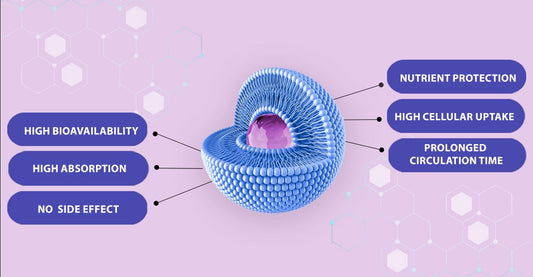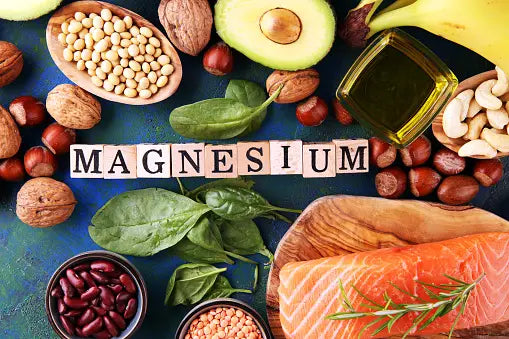

Glutathione Vs Liposomal Glutathione : What's the Difference?
Table of Contents
Glutathione and liposomal glutathione are both gaining popularity for their potential benefits to the body. Glutathione is a potent antioxidant that helps protect cells from damage caused by free radicals and toxins. But what exactly is liposomal glutathione, and how does it differ from regular glutathione?
In this blog post, we will delve into the science behind both forms of glutathione, exploring how they work and what sets them apart. We will also take a closer look at the benefits of each, along with any potential side effects you should be aware of. So if you're curious about these powerful antioxidants and want to know which one might be right for you, read on!
What is glutathione?
Glutathione, a powerful antioxidant, plays a vital role in detoxification and helps protect cells from oxidative stress. It supports the immune system by promoting healthy cellular function. Though naturally produced by the body, glutathione can also be taken as a supplement to maintain overall health.
What is liposomal glutathione?
Liposomal glutathione is a specialized form of glutathione that offers enhanced delivery capabilities. Encapsulated in liposomes, it ensures better absorption and utilization by the body, leading to higher levels of glutathione in the bloodstream. This form of glutathione is commonly used as a supplement for its health benefits.

Difference between glutathione and liposomal glutathione
Glutathione and liposomal glutathione are both forms of the same molecule, but they differ in their method of delivery and absorption in the body.
- Glutathione:
- Definition: Glutathione is a powerful antioxidant molecule that is naturally produced in the body. It plays a crucial role in detoxifying the body by removing harmful substances.
- Form: Glutathione is available in various forms, including oral supplements, injections, and topical creams.
- Absorption: When taken orally, regular glutathione supplements often have low bioavailability, meaning they are not effectively absorbed by the body. This is because glutathione is broken down in the digestive system before it can reach the bloodstream in significant amounts.
- Liposomal Glutathione:
- Definition: Liposomal glutathione is a specialized form of glutathione where the molecules are encapsulated in liposomes, which are tiny lipid (fat) spheres.
- Form: These liposomes protect the glutathione molecules as they pass through the digestive system, allowing them to be absorbed intact into the bloodstream.
- Absorption: Liposomal glutathione has higher bioavailability compared to regular oral glutathione supplements. The liposomes protect the glutathione from being broken down in the digestive tract, improving its absorption and delivery to cells.

How do they work?
Glutathione and liposomal glutathione work by replenishing and maintaining adequate levels of this crucial antioxidant. Glutathione neutralizes free radicals and supports cellular detoxification, while liposomal glutathione utilizes liposomes for optimal delivery to cells. Both forms help maintain cellular health and support the body's natural defense systems.
What Makes Liposomal Glutathione More Beneficial Than Regular Glutathione?
Glutathione is a powerful antioxidant that plays a key role in various bodily processes, including detoxification, immune support, and free radical scavenging. Liposomal glutathione is a specialized form of glutathione that is encapsulated within lipid molecules, which are similar to the body's cell membranes. This unique structure provides some potential advantages over regular glutathione supplements:
- Improved Absorption: Glutathione supplements, when taken orally, often have low bioavailability, meaning the body absorbs only a small percentage of the ingested dose. Liposomal encapsulation protects glutathione from the harsh environment of the digestive system, allowing for better absorption in the intestines. This can result in higher levels of glutathione reaching the bloodstream and, subsequently, the cells.
- Protection from Degradation: Glutathione is a fragile molecule and can easily degrade in the digestive tract or bloodstream. Liposomal encapsulation protects glutathione from degradation, ensuring its stability until it reaches the target cells.
- Cellular Delivery: Liposomes are small vesicles that can fuse with cell membranes, delivering their contents directly into the cells. This targeted delivery enhances the uptake of glutathione by cells, especially those in organs and tissues where glutathione is in high demand, such as the liver.
- Reduced Oxidation: Glutathione is susceptible to oxidation, which can render it ineffective as an antioxidant. Liposomal encapsulation provides a protective barrier against oxidation, maintaining the antioxidant properties of glutathione.
- Higher Intracellular Levels: Liposomal glutathione can increase the levels of glutathione within cells more effectively than regular glutathione supplements. This is particularly important because glutathione exerts its antioxidant effects inside the cells, where it neutralizes free radicals and supports various cellular functions.
- Support for Sensitive Individuals: Some individuals may experience digestive discomfort or allergic reactions with regular glutathione supplements. Liposomal formulations are generally gentler on the stomach and may be better tolerated by sensitive individuals.
It's important to note that while liposomal glutathione offers potential advantages in terms of absorption and effectiveness, individual responses to supplements can vary. Before starting any new supplement regimen, it's advisable to consult a healthcare professional, especially if you have underlying health conditions or are taking medications, to ensure it is appropriate for your specific situation.

What are the best uses for liposomal glutathione?
Liposomal glutathione can be used for a variety of purposes, including:
- Boosting the immune system
- Reducing inflammation
- Detoxifying the body
- Protecting against oxidative damage
- Improving athletic performance
- Reducing the appearance of wrinkles and fine lines
What are the side effects of liposomal glutathione?
Liposomal glutathione is generally safe and well-tolerated. However, some people may experience side effects such as nausea, diarrhea, and stomach upset. Liposomal glutathione may also interact with certain medications, so it is important to talk to your doctor before taking it.
What is the best dosage of liposomal glutathione?
The best dosage of liposomal glutathione will vary depending on your individual needs. It is important to talk to your doctor before taking liposomal glutathione, especially if you have any underlying health conditions.
What is the best time of day to take liposomal glutathione?
Liposomal glutathione can be taken at any time of day. However, some people find that it is best to take it on an empty stomach, as this may improve absorption.
How long does it take to see results from liposomal glutathione?
It may take several weeks or even months to see results from liposomal glutathione. This is because glutathione levels in the body build up over time.
Is liposomal glutathione safe for long-term use?
Liposomal glutathione is generally safe for long-term use. However, it is important to talk to your doctor before taking liposomal glutathione for long periods of time, especially if you have any underlying health conditions.
Let’s Sum Up
To sum it up, both regular glutathione and liposomal glutathione have their own benefits and uses. Regular glutathione is a powerful antioxidant that helps detoxify the body and boost the immune system. On the other hand, liposomal glutathione offers better absorption and bioavailability, meaning it is more effectively absorbed by the body.
This makes liposomal glutathione a preferred choice for individuals who need higher doses or have difficulty absorbing regular glutathione. Before incorporating any supplement into your routine, it is important to consult with a healthcare professional to determine the best option for you. Remember, everyone's needs are different, and what works for one person may not work for another.
















